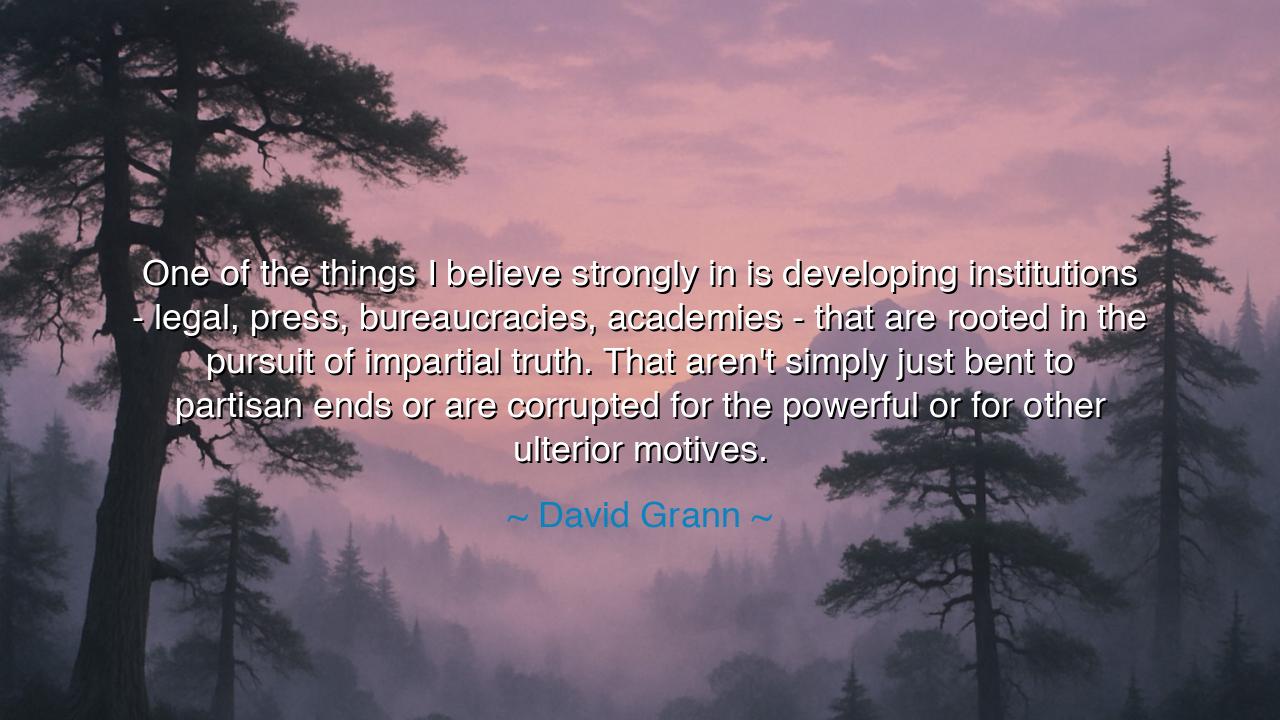
One of the things I believe strongly in is developing
One of the things I believe strongly in is developing institutions - legal, press, bureaucracies, academies - that are rooted in the pursuit of impartial truth. That aren't simply just bent to partisan ends or are corrupted for the powerful or for other ulterior motives.






The words of David Grann are both a warning and a prayer for civilization itself: “One of the things I believe strongly in is developing institutions — legal, press, bureaucracies, academies — that are rooted in the pursuit of impartial truth. That aren’t simply just bent to partisan ends or are corrupted for the powerful or for other ulterior motives.” In this single declaration lies the heartbeat of democracy, the soul of justice, and the conscience of knowledge. Grann speaks not as a politician nor as a mere observer of history, but as a chronicler of truth — one who has seen what happens when institutions lose their purity and bend beneath the weight of corruption and power.
In the ancient world, civilizations rose and fell not merely by sword or famine, but by the decay of their institutions. When truth was no longer sacred, kings became tyrants, priests became deceivers, and scholars became flatterers of power. The Greeks once built the Academy as a temple of inquiry; the Romans enshrined the rule of law in their Republic. But when self-interest replaced principle, when the Senate bowed before Caesar’s will, the Republic crumbled into empire. Grann’s words echo across that same historical pattern — a timeless reminder that the endurance of nations depends not on armies or wealth, but on the integrity of the institutions that safeguard honesty and justice.
The pursuit of impartial truth — that phrase alone shines like a beacon through the darkness of the modern age. Truth, Grann reminds us, must stand apart from the shifting tides of politics and power. When the press becomes the servant of parties, when the law becomes a weapon of vengeance, when academia becomes a marketplace of ideology rather than wisdom, the light of reason begins to dim. Truth cannot be partisan. It cannot be sold. It must remain sacred — protected by those brave enough to defend it even when it is inconvenient, even when it is dangerous.
History offers its martyrs to this cause. Think of Galileo Galilei, who gazed through his telescope and saw a world that defied doctrine. The powerful commanded him to deny what his eyes had revealed, but he whispered, “E pur si muove” — “And yet it moves.” In that defiance, Galileo upheld not only science, but the principle that truth must not bend to authority. His persecution is the eternal warning of what happens when institutions of knowledge serve fear instead of honesty. Grann’s call is the modern echo of that ancient courage: to build systems that protect truth from the claws of greed and tyranny.
Corruption, in its subtlest form, often disguises itself as loyalty. Men twist truth in service of causes they believe noble — political factions, national pride, personal ambition. But as Grann warns, once institutions are “bent to partisan ends,” they cease to serve the people and begin to serve power itself. The result is always the same: division, distrust, and decay. A nation’s press becomes propaganda; its laws become instruments of oppression; its academies produce not thinkers, but loyal functionaries. Such a society rots from within long before its enemies strike from without.
Yet there is hope in Grann’s vision, for he does not merely lament; he calls us to action. To develop institutions rooted in impartial truth is not to preserve the past but to secure the future. It means training minds to question, to verify, to think beyond faction. It means defending journalists who expose corruption, protecting scholars who speak unpopular truths, and demanding transparency from leaders who claim to serve justice. Every citizen, in small ways, can become a guardian of integrity — by refusing to spread falsehoods, by holding power to account, and by upholding fairness even when it costs them comfort.
The lesson is clear: civilizations survive only when they honor truth above tribe, justice above power, and reason above rhetoric. When institutions are fortified with honesty and guided by humility, they become like pillars of marble, holding aloft the sky of human progress. But when they are corrupted, even the mightiest empire crumbles into dust.
So, to the generations that will inherit the earth, heed this wisdom of David Grann: nurture your institutions as gardeners nurture trees. Feed them with truth, prune them of corruption, protect them from the storms of partisanship. For the world does not end in a single catastrophe — it ends in the slow forgetting of truth. And if you remember this, if you defend impartiality even when the powerful sneer, then you will not only preserve the law, the press, and the academy — you will preserve the very soul of civilization.






AAdministratorAdministrator
Welcome, honored guests. Please leave a comment, we will respond soon